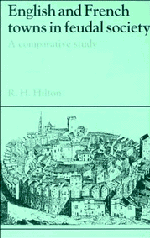6 - Urban communities and conflict
Published online by Cambridge University Press: 03 May 2011
Summary
As we have seen, the concept that towns were an essential component of the feudal social formation does not imply the existence of a social harmony such as was preached by the exponents of the theory of the three orders. Class conflict was as much present in feudal as in capitalist society. Our concern here is to examine these conflicts which were specific to the towns. These may be summarised as those between urban communities and the various representatives of feudal interests; those between the crafts and their allies against the mercantile oligarchies; and those within the crafts between the masters and the journeymen. These categories of social conflict no doubt appear somewhat simplified here, so we have to take into account also the involvement of other social strata, such as the unskilled workers outside the craft structure, and the marginals, not to speak of splits within the main classes – that at Norwich in the mid-fifteenth century, for example, which we have just described in another context.
COMMUNES AND BOROUGH FRANCHISES
Early medieval urban communities, or rather the merchants who spoke for them, asked for the privileges which would give them freedom for mercantile activity. These privileges were very much the same in the French communes, in the villes de franchise and the villes de consulat as well as in the English free boroughs.
- Type
- Chapter
- Information
- English and French Towns in Feudal SocietyA Comparative Study, pp. 127 - 151Publisher: Cambridge University PressPrint publication year: 1992

